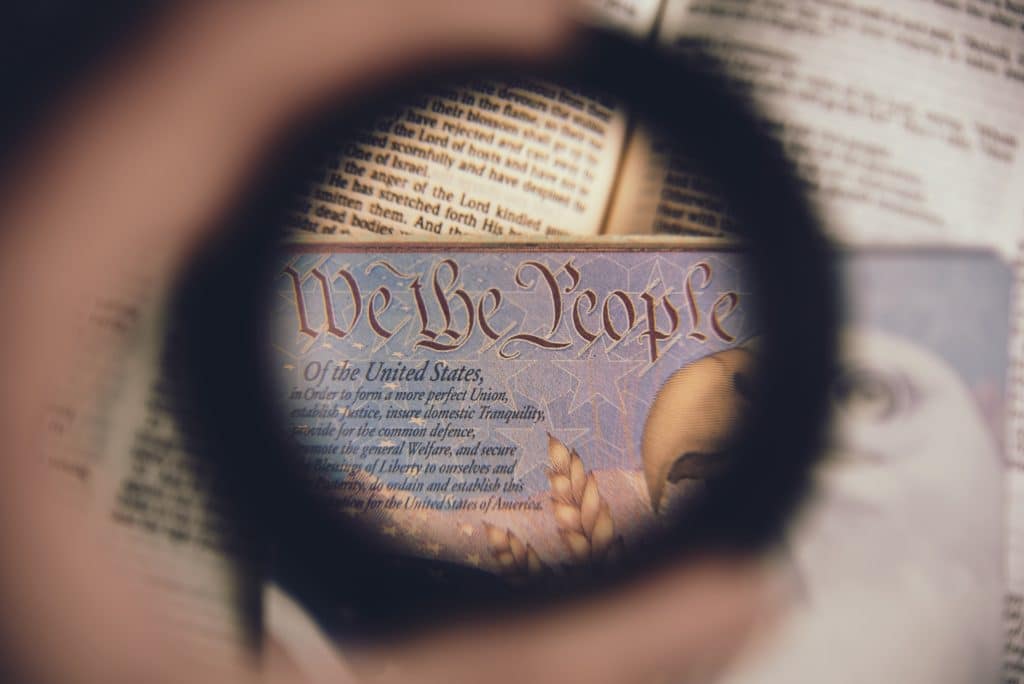
The United States constitution is the foundational document that sets forth the rules and principles our nation was founded on. It is the law of the land. It sets forth the fundamental rights guaranteed to each citizen, born by the blood of our forefathers. The United States Supreme Court, the highest court in the nation, decides issues of constitutional law. The importance of the constitution can not be overstated, yet, many are unaware of their full rights under it. One particular class in law school, criminal procedure, taught me the nuances of applying and protecting our constitutional rights in everyday scenarios. One of our most important rights is guaranteed by the fourth (4th) amendment, it protects our right against warrantless, unreasonable searches and seizures. It reads:
“The right of the people to be secure in their persons, houses, papers, and effects, against unreasonable searches and seizures, shall not be violated, and no Warrants shall issue, but upon probable cause, supported by Oath or affirmation, and particularly describing the place to be searched, and the persons or things to be seized.” U.S. Const. Amend. IV.
PRIVACY
Essentially, the fourth (4th) amendment right boils down to this: If one has a reasonable expectation of privacy in any given scenario, then the government cannot violate that reasonable expectation of privacy without a very good reason. Violation of a person’s reasonable expectation of privacy is considered a “search.” Whether an action falls within the purview of the fourth (4th) amendment requires that there be an actual, subjective expectation of privacy that is reasonable, i.e., generally accepted by society. For example, one has a reasonable expectation of privacy in their residence, hotel room, public bathrooms, phone booths and any other public location specifically provided to ensure privacy. In contrast, one does not have a reasonable expectation in things generally held out to the public. For example, one’s conversation if overheard in a public arena, one’s garbage left out for collection, anything in open fields, anything left out in plain view, there is no set list, the limits of the fourth (4th) amendment must be looked at through case precedence.
While the fourth (4th) amendment is an absolute right, certain circumstances allow the government to violate the right in the interest of safety or justice. Similar to the different standards of proof required for a civil lawsuit versus a criminal prosecution, there are different standards of reliability required by law enforcement in order to conduct a search. “Reasonable suspicion” is a reasonable presumption that a crime is being or will be committed, this can be based on the officer’s experience, training and factual circumstances. This is more reliable than a guess or hunch, but less reliable than probable cause. “Probable cause” is the belief, based on the factual circumstances, that a crime has likely occurred or is about to be committed. If a search is conducted and evidence seized as a result, the evidence could possibly be excluded if the search was conducted without the proper degree of reliability by the police officer. Such evidence is sometimes referred to as the fruit of a tainted tree, because it was the product of an illegal search, it too is poisonous and cannot be used as evidence. A warrant, which is an order signed by a judge allowing a specific search and/or seizure, requires probable cause. The law enforcement official seeking the warrant must provide enough factual evidence that there is probable cause justifying a warrant, as decided by the judge. An arrest also requires probable cause. In contrast, a police officer only needs reasonable suspicion to stop and question an individual.
THE HOME
By tradition and law, our home is considered the most sacred and private of places. One has the highest expectation of privacy in their home, therefore it is designated with the most stringent requirement of reliability if violated. Meaning, the government must have a warrant based on probable cause to enter your home for purposes of search and seizure. This includes your gated front yard, side yard, backyard, and anything that is considered part of your home (in law school they refer to this as “curtilage”). It doesn’t matter if you rent or own, you are afforded the same level of privacy inside your home. However, there are certain scenarios that allow police officers to bypass this warrant requirement. First, if there is criminal activity within plain sight inside the house, the police officer can go in and investigate. For example, if there is clearly under-aged drinking going on in the background, or a line of cocaine on the table, these scenarios may be enough for the police officer to legally enter one’s home without a warrant to investigate. Second, police officers can enter your home without a warrant if it is in protection of life or safety. For example, if the police officer saw someone’s life in danger inside the house, they could enter without a warrant to intervene. Other than these two scenarios, there is generally a high level of respect given to one’s privacy inside their own home.
As many college students have experienced, the college party that gets too loud and eventually broken up by the police always triggers an ensuing panic by the party goers. In almost all of these stories, the officer knocks on the door, the host opens the door and leaves it open for the officer to see everything inside. If the officer sees illegal activity or issues of safety, the officer will be able to enter the home without a warrant. One practical solution is to simply close the door behind you. While you are obligated to answer the police officer’s questions and comply with their investigation, this conversation can occur outside. You are under no obligation to let the police officer look into your house; without a warrant, you are also under no obligation to let him inside. This is not meant to be advice on how to avoid being discovered conducting illegal activities. Rather, I believe it is important to understand one’s constitutional rights and to protect them for yourself, and on behalf of others, when those rights are infringed.
THE CAR
While one has the highest expectation of privacy in their home, there is a proportionate less degree of privacy to be expected in one’s car, especially while driving on public roads. Therefore, a police officer does not require a warrant in order to search a person’s car, all they require is probable cause. Indeed, only reasonable suspicion is required to pull you over. One can often lead to the other. For example, a broken tail light is more than enough to get pulled over. However, if the police officer smells weed, his reasonable suspicion from the tail light may have escalated to probable cause that some other crime is being committed because of the smell of weed. While recreational marijuana is legal in California, driving while intoxicated is not. As well, police officers often associate weed with other drugs, and drugs with higher crime. Moreover, if this occurred in a dangerous, high-crime neighborhood, the police officer will have even more reason to conduct a search. The best advice to not get pulled over is to keep your vehicle well-maintained, per DMV requirements, and follow vehicle and road laws.
At this point during the discussion, there will invariably be a law school student sitting in the front row who asks, “what about a mobile home?” Like all hypothetical questions, the answer always depends on the specific facts involved. For example, on one side of the spectrum, if the mobile home is parked in an area where one has to purchase (or rent) the lot, pay property taxes, requires a physical connection for plumbing and electricity, has no attached motor, is on concrete blocks or has no wheels, and has other features of permanence, this is all evidence that points in the direction of a traditional home that requires a warrant based on probable cause if it is to be searched. On the other side of the spectrum is the weekend-warrior, mobile home on wheels that is driven to various vacation spots, it can survive on its own for weeks or it can alternatively plug all of its systems into a mobile home rest spot, it is not the primary residence of the owner. It can be argued that these latter scenarios describe more of a vehicle than a home and therefore does not require a warrant to search. Still further, is the tiny house movement that is storming home DIY networks, the concept is building tiny but luxurious houses on mobile platforms. They have all the furnishings of a house but are literally located on a truck bed or trailer. As you can see, the nuances of factual scenarios stress the limitations of law.
THE CELLPHONE
Does one have a reasonable expectation of privacy for the contents of their cell phone? The answer is yes, however, to what degree? A warrant is required to search one’s cell phone. However, one’s cell phone may be seized, upon probable cause, pending the issuance of a warrant to search its contents. Cell phone GPS tracking information has recently been deemed by the U.S. Supreme Court be protected by the fourth amendment, meaning one has a reasonable expectation of privacy over their GPS tracking data. If you have ever turned on GPS data for a map application, chances are your whereabouts have already been logged by the system.
One of the great things about our constitution is that it’s fundamental principles are relevant and applicable regardless of the time or the current technology. Our forefathers never could have imagined the concept, let alone the existence of something like Google maps, nonetheless, the fourth (4th) amendment protects our right against unreasonable, warrantless searches of our GPS tracking history.
DISCLAIMER: The content above is entirely the opinion of Pan Law Group, Inc. and should in no way be considered legal advice. Please contact us for a free legal consultation if you have any questions. Thank you.





